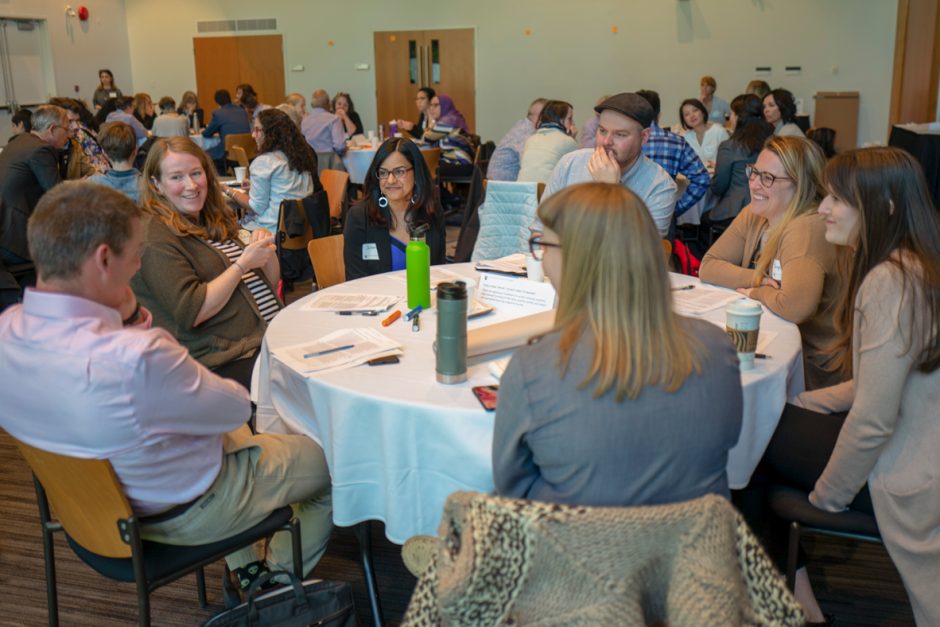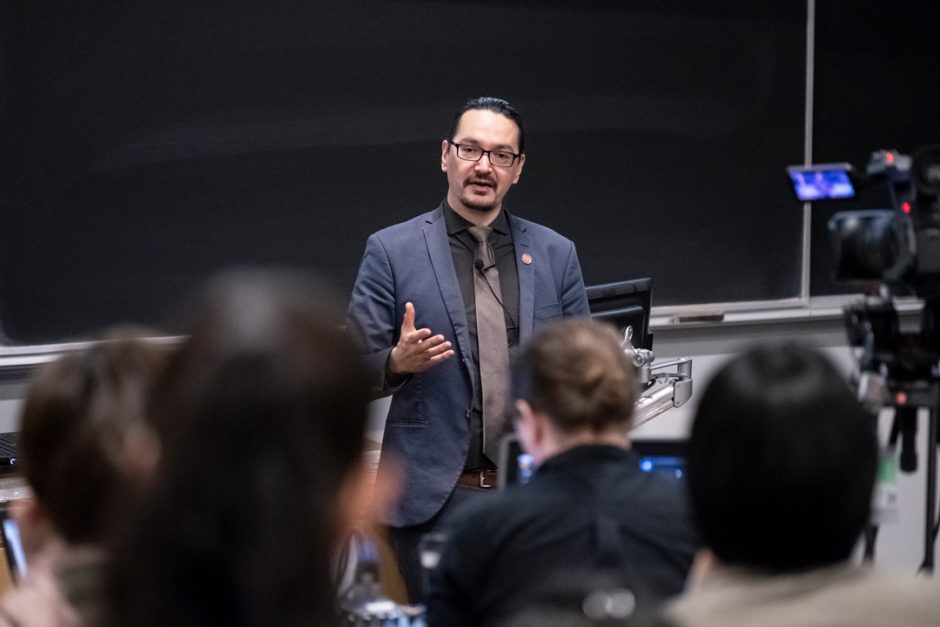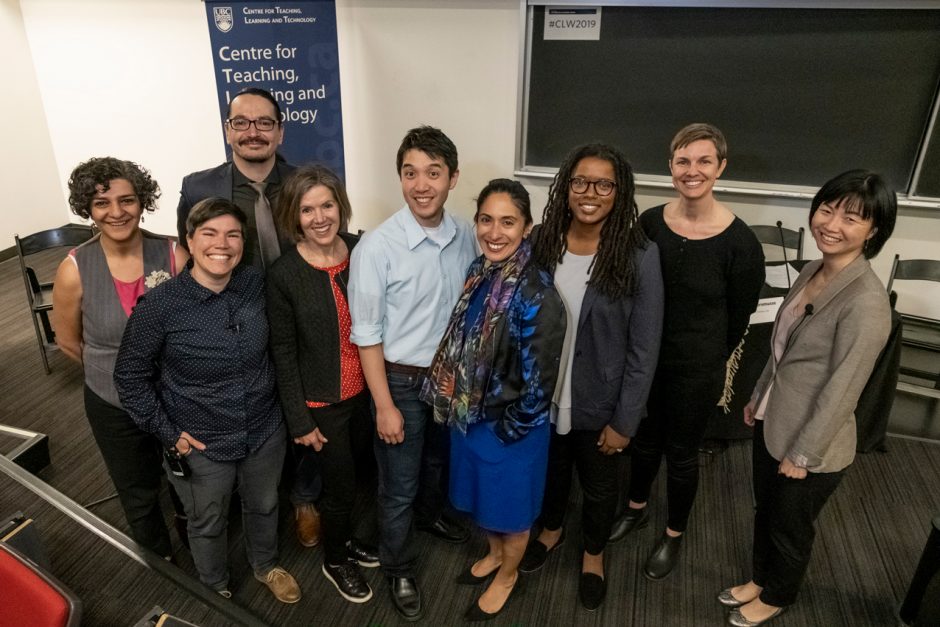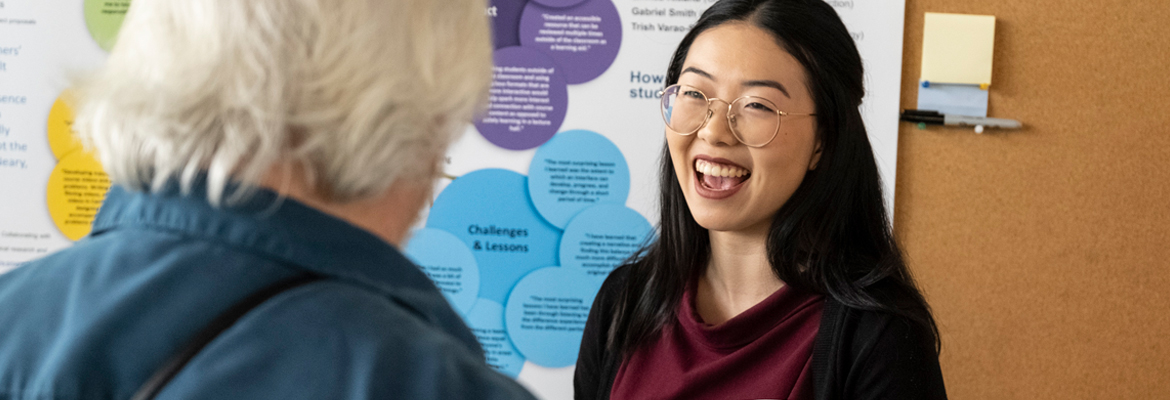The eleventh annual Celebrate Learning Week took place April 29 through May 5 at UBC’s Vancouver campus, featuring 21 events from 9 departments showcasing teaching and learning at UBC. Celebrate Learning Week was initially spearheaded by Anna Kindler in 2008 when she was the Vice-Provost and Associate Vice-President Academic Affairs and is currently supported by Eric Eich in his current role. The Centre for Teaching, Learning and Technology oversees the campus-wide event. This year’s inclusive-teaching themed week welcomed 400 attendees. Read below for a summary of the week’s highlights.

Discussion during “A Dialogue on Experiential Learning at UBC Vancouver”
“A Dialogue on Experiential Learning at UBC Vancouver” was hosted by Simon Bates and Janet Teasdale on April 29 in a cross-unit partnership between the Centre for Community Engaged Learning, the Centre for Student Involvement and Careers, and the Centre for Teaching, Learning and Technology. Experiential learning analyst, Kari Grain, presented key research findings from a year-long study that examined experiential learning in relation to current practices, motivations, supports, and challenges. Key themes were extracted from the findings and attendees participated in a series of facilitated discussions that were aimed at refining institutional priorities and generating potential solutions to challenges at the individual level, unit/faculty level, and systemic level. Attendees discussed challenging themes such as accessibility for diverse students, the additional time commitment that experiential learning requires, as well as risk and responsibility.
The two-day long Graduate Students in Teaching Mini Conference was held on April 30 and May 1. It engaged graduate students through participatory sessions, round table discussions, poster sessions, and a panel discussion around developing one’s teaching career.
“Theatre of the Distressed: Exploring Conflict for TAs,” facilitated by Liesl Lafferty and Roquela Fernandez, was both an entertaining and insightful exploration of utilizing the conflict theatre process in the classroom. Two scripted scenes were enacted, the first involving a professor and a TA, and the second between a TA and a student. In both scenarios, the TA was the oppressed party. Conference attendees were invited to interrupt and reroute scenes, raising questions about gendered assumptions and communication, power dynamics, negotiation techniques, and how one’s behaviour can be perceived.
This lively session was humorous yet thought provoking, proving that empathy and communication are vital when navigating the relationships between students, TAs, and professors. Conflict theatre training is available in partnership with UBC HR.
Day two of the Graduate Students in Teaching Mini Conference welcomed the Career in Teaching Panel, which featured the following participants:
- Isabeau Iqbal, PhD, Educational Developer, Centre for Teaching, Learning and Technology
- David Oliver, PhD, Instructor, Department of Microbiology and Immunology
- Rowshan Rahmanian, PhD, Post-Doctoral Fellow
- Lacey Samuels, PhD, Professor, Department of Botany
Graduate student programs facilitator, Joseph Topornycky, first asked the panel, “Why do you care about teaching?” This prompted a variety of responses centered on the ability of teaching to provide an immediacy to one’s work: “You see the lights go on,” said Lacey Samuels. Rowshan Rahmanian explained that through teaching, he is able to transfer knowledge that he knows can help people, whereas Samuels has personally experienced how having multiple roles as a researcher and parent has inspired her students to pursue a family alongside their careers. “If you take time for your students, they will succeed and you will succeed,” said David Oliver, who values his role as a mentor. Isabeau Iqbal provided an additional perspective, given her work teaching faculty one-on-one. “You are doing a lot,” she said of the faculty she works with. She views her role as to help faculty recognize what they are doing well and what they can build on.
Teaching within an institutional setting can provide benefits as well as challenges. The panelists supported structural changes which are occurring at UBC: Oliver referenced UBC’s strategic plan which aims to expose undergraduates to experiential learning, an essential part of the fourth-year capstone courses he teaches, which provide students with employment opportunities in research. Samuels explained that support from the Faculty of Science is able to create community through initiatives such as the Skylight Supper Series, which facilitates discussion of innovations. “Aligning with the university’s strategic plan can actually change things,” she said.
“Equity and Inclusion in Teaching and Learning: Student Perspectives” was a panel discussion held on May 1, featuring five students from a variety of departments. The discussion began with an exploration of how to create spaces of belonging, drawing on the students’ experiences. Some of the positive examples of how their instructors had set up their classrooms included: classroom settings where instructors and students face each other in a circle, instructors making a personal connection to students, syllabus statements that speak to inclusion, and introductions where participants speak about their identities.
The panelists also explored what poses challenges to their sense of belonging in their learning processes. Students discussed that they feel excluded or isolated when they cannot see themselves reflected in course offerings, materials, and class discussions. For example, an International Relations student explained that discussions within their discipline can be challenging when they centre around a specific part of the world which every student may not be familiar with. When there isn’t curiosity from others to hear differing perspectives, exclusion can occur.
The panelists emphasized the important role of instructors in responding to challenging classroom moments both retroactively and proactively. They discussed how challenging it can be when the onus is placed on an individual from a particular background to speak on behalf of an entire group or identity. They found it helpful when instructors were able to re-frame discussions and explain that one individual is not automatically a spokesperson for a group that they belong to. The panelists found it very effective for instructors to set community agreements within their classrooms, which provide a foundational framework for group work and class discussion which all participants agree to collectively at the beginning of the class.
The panel discussion extended to address some structural issues. Panelists recognized that it may be relatively easier for instructors to facilitate dialogue and mediate difficult moments within smaller classes, but it can be more difficult to do so in large, lecture-heavy environments. The panelists identified a need for a greater diversity of courses in program requirements, which tend to be broad, general courses, as well as further opportunities for shared learning through increased access to student directed seminars. Such classes offer opportunities for meaningful, shared learning, yet students are currently only able to take one student-directed seminar during their degree.

Keynote Speaker: Kevin Lamoureux, University of Winnipeg
Keynote speaker, Kevin Lamoureux, delivered a highly affecting address on May 2, entitled “Healing the Wound with the Weapon: Post-Secondary Education and Reconciliation.” Lamoureux is a lecturer in the Faculty of Education at the University of Winnipeg and previously held the role of Associate Vice President, Indigenous Affairs. His speech was rooted in the 94 calls to action featured in the Truth and Reconciliation Commission of Canada (TRC), which he travelled to Ottawa to attend the release of in 2015. Referring to it as “our roadmap home,” Lamoureux named specific calls to action, such as #3, a call upon all levels of government to fully implement Jordan’s Principle, which is meant to ensure that Indigenous children have their health, social and educational needs met. He explained that Call to Action #62.2, which states, “Provide the necessary funding to post-secondary institutions to educate teachers on how to integrate Indigenous knowledge and teaching methods into classrooms,” is being asked of us because “cultural wounds require cultural healing.”
He integrated Indigenous knowledge (gikendaasowin) throughout his lecture, introducing Ojibwe vocabulary and applying its meaning to the discussion. Addressing the university as a colonial institution, Lamoureux spoke of the trauma which has been inflicted upon Indigenous peoples and funded by universities, such as coerced sterilization and nutritional experiments. He presented opportunities for working with allies in order to alter the university into a place where healing can occur. One example of this is through the mandatory Indigenous course requirement which the University of Winnipeg implemented in fall 2016, following calls from their student body. Lakehead University in Thunder Bay, Ontario also has such a requirement.
Lamoureux introduced the concept of mino-pimatisiwin, which translates to, “Are you the you [that] you were meant to be?” He stated that this is the mandate of higher education: to empower students. To create okwabiwag (belonging, community), he spoke of the importance of deconstructing otherness, stating that Indigenous peoples are the other within Canada. Centering the role of education in his address, Lamoureux quoted Grand Chief Wilton Littlechild, who stated that 74 of the 92 calls to action within the TRC are regarding education and awareness: “Doing nothing tomorrow is a decision.” View the keynote address in full.

CLW Faculty Panel and Moderators
After the keynote concluded, lunch was held as attendees viewed the TLEF (Teaching and Learning Enhancement Fund) Showcase, a bustling session which included 50 posters featuring varied research supported by the fund. Poster topics ranged from integrating language learning and community engagement through the study of Himalayan languages to embedding equity, diversity and inclusion in TLEF projects, as well as utilizing VR technology to teach anatomy. View the virtual showcase.
Following the TLEF Showcase, a faculty panel convened to discuss Equity and Inclusion in Teaching and Learning, which featured Kevin Lamoureux as well as UBC faculty from across disciplines. Professor of Teaching in the Faculty of Education, Wendy Carr, emphasized the role of faculty in modelling inclusion to students through practices such as featuring an inclusion statement in one’s syllabus, as well as considering how to structure evaluations and methods of engagement.
Psychology Lecturer, Benjamin Cheung, detailed the methods of inclusion which he uses in the classroom, including the use of an anonymous question box which generates fruitful discussions. A crucial point was brought up by Aftab Erfan, Director, Dialogue & Conflict Engagement, Equity & Inclusion Office, and a Sessional Lecturer at the School of Community and Regional Planning (SCARP). She stated that within the classroom, one should design their class in consideration of different identities: we should be most conscious of including what is below the neck – one’s heart and identity. However, one of the colonial aspects of the university is teaching from the neck up – intellectually. Cheung highlighted the need to develop a dialogue with students and empower them with greater control through informing them of processes available to them for accommodation, such as the ability to ask for extensions.
Mentorship was highlighted as a beneficial process, which Sara Ghebremusse, Assistant Professor at the Peter A. Allard School of Law, would like to see become a more formalized process. Carr stated that faculty need to be explicit about what guides their work. Teacher candidates are guided by personal and professional values: respect, equity and inclusion, human rights, and social justice. It is their responsibility as professionals to hold their personal biases and opinions to one side. View the faculty panel discussion in full.
Through bringing together faculty, students, and staff from across the university and beyond to engage in pertinent discussion about teaching and learning, Celebrate Learning Week enriched conversations surrounding equity and inclusion, which is promising for the continually developing role of institutions such as universities in becoming spaces where students are able to realize their full potential.
View photos from Celebrate Learning Week.

